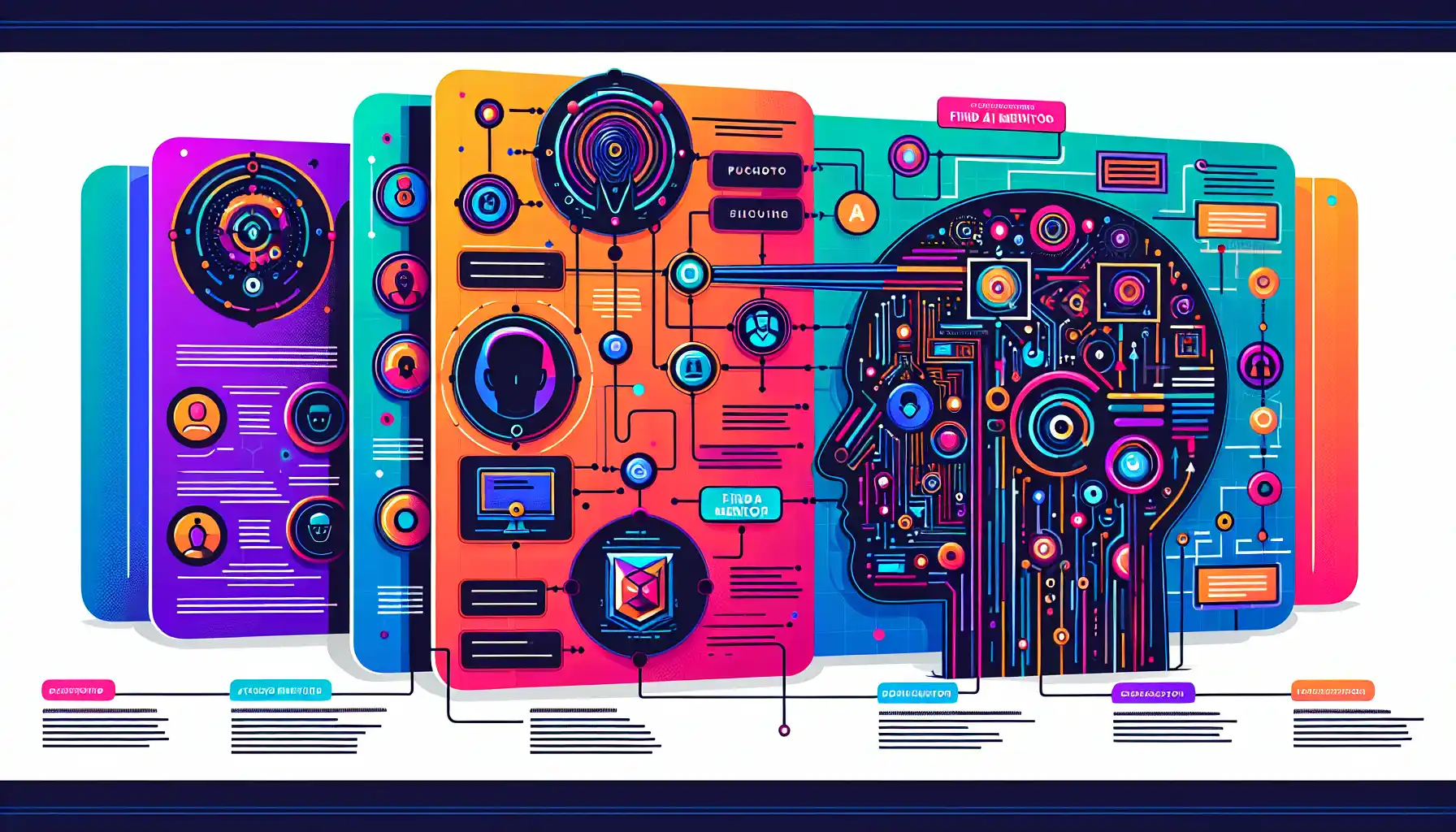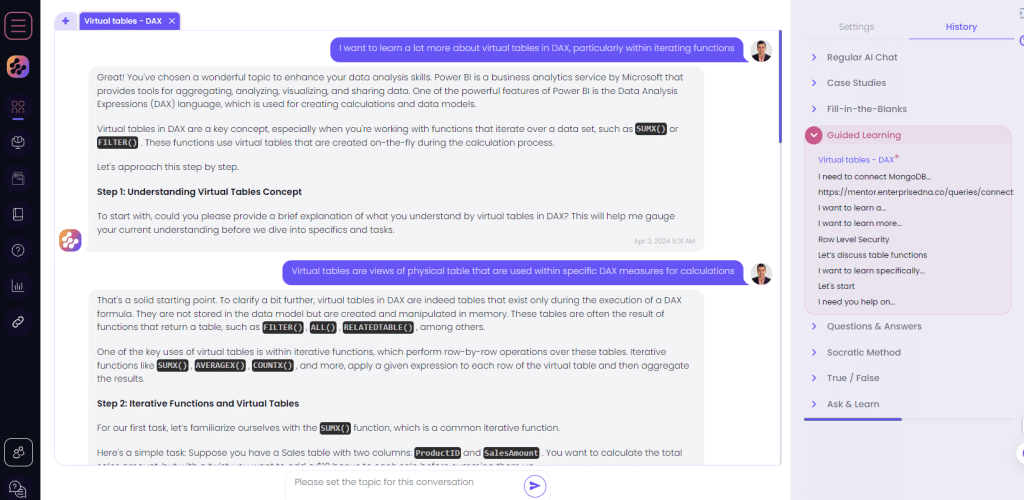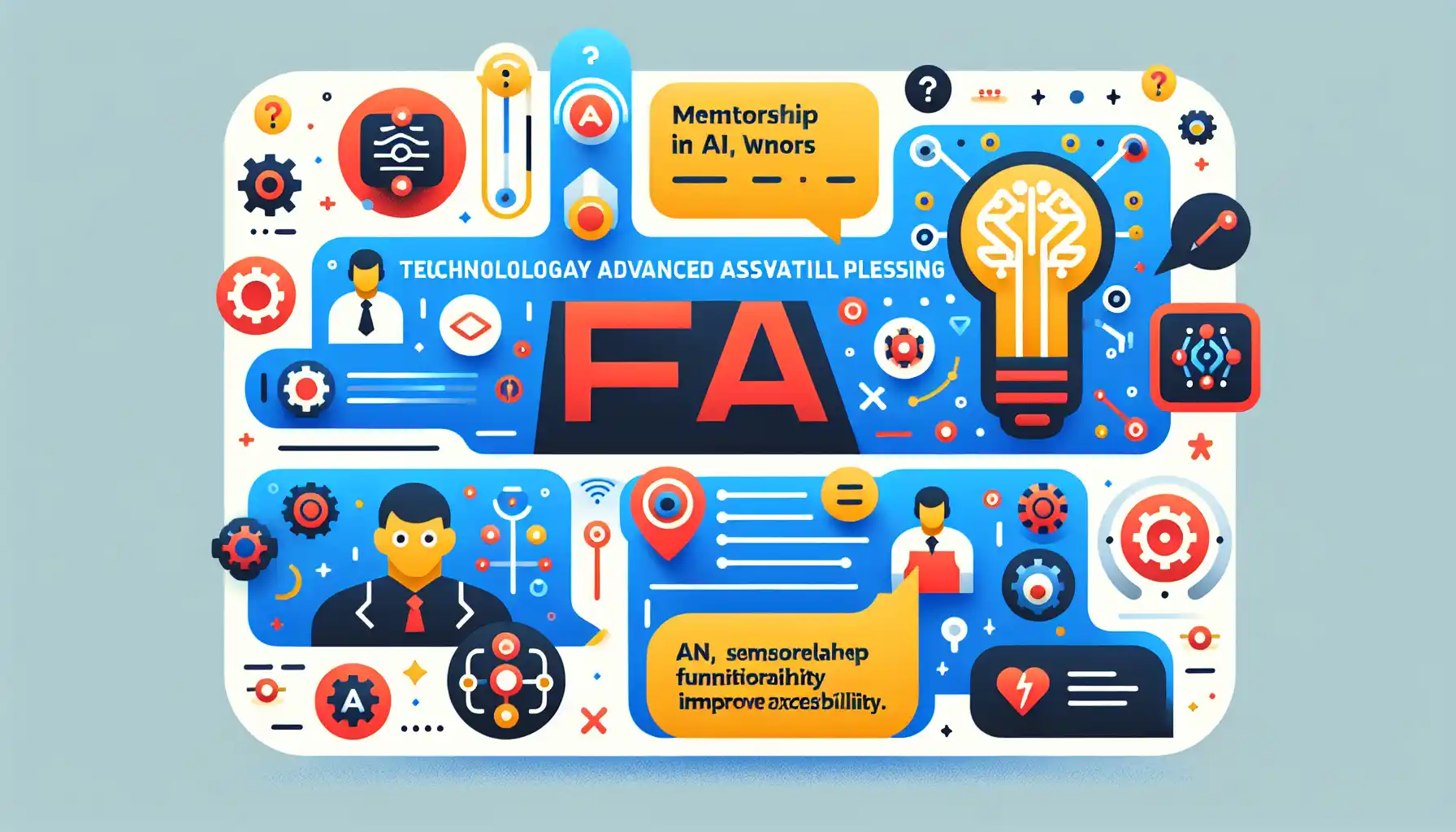So, you’re considering a career in AI. With so much buzz around the industry, it’s no wonder you’re intrigued. But what’s the best way to get ahead and stay there? We’ve got one word for you: Mentorship.
Mentorship in AI can be a game-changer. It can help you understand the industry’s complex landscape, connect with influential figures, and find opportunities you’d never have on your own. Having an experienced guide can fast-track your learning, sharpen your skills, and steer you away from common pitfalls. It’s the secret weapon that’ll give you an edge in this competitive field.
Whether you’re just starting in AI or are a seasoned pro, mentorship can help you achieve your career goals. In this article, we’ll dive into how mentorship can help you at every stage of your AI journey. We’ll also give you some tips on finding the perfect mentor to propel your career forward.
Understanding Mentorship in AI

AI mentorship involves a more experienced person guiding a less experienced one in their AI journey. The mentor shares knowledge, skills, and insights to help the mentee grow and succeed in the field.
In AI, mentorship can be even more crucial. This is because the field is rapidly evolving and often requires specialized knowledge. Having a mentor can help you navigate this complex landscape.
How Mentorship Can Benefit You

Mentorship can benefit you in numerous ways. In the following section, we’ll go over some of the key benefits of mentorship in AI. Understanding these benefits can motivate you to seek mentorship and develop a mentor-mentee relationship.
1. Get Personalized Guidance
AI is a vast field with various applications and specializations. A mentor can help you identify the areas you’re most interested in and provide guidance on the specific skills and knowledge you need to develop.
2. Faster Learning
AI is an evolving field, and keeping up with the latest trends and technologies can be challenging. A mentor can help you stay up-to-date and learn new concepts and tools more efficiently.
3. Avoid Mistakes
Learning from your mistakes is valuable, but learning from others’ mistakes is even better. A mentor can share their experiences and help you avoid common pitfalls in your career.
4. Networking
Mentors often have a wide network of contacts in the AI industry. They can introduce you to potential employers, collaborators, or other professionals who can help you advance your career.
5. Feedback
Constructive feedback is essential for growth. A mentor can provide you with valuable feedback on your work, helping you improve your skills and performance.
6. Increased Confidence
The guidance and support of a mentor can boost your confidence in your abilities. This can be especially helpful if you’re new to the field and feel overwhelmed by its complexity.
7. Job Opportunities
Mentors can provide you with information about job opportunities in the AI field. They can also give you tips on how to stand out during the application and interview process.
8. Personal Development
Mentorship can help you develop important soft skills, such as communication, problem-solving, and leadership. These skills are often just as crucial as technical skills in the AI industry.
9. Better Decision Making
Mentors can offer valuable insights and perspectives that can help you make better decisions in your career. They can also help you weigh the pros and cons of different options.
10. Career Advancement
Having a mentor can significantly impact your career progression. Mentored employees are more likely to be promoted and are more satisfied with their careers.
3 Types of AI Mentors

There are three types of AI mentors: traditional mentors, AI mentors, and peer mentors. In this section, we’ll go over each of these types of mentors, and you’ll see examples of each type of mentorship.
1. Traditional Mentors
These are individuals with extensive experience in AI and related fields. They offer personalized guidance and advice, drawing from their own experiences. They can help you set goals, develop skills, and navigate your career path.
For example, you might be interested in using AI for cancer research. A traditional mentor could be an established researcher in the field of oncology or AI. They can help you understand the current state of research, identify areas for improvement, and guide you on how to apply AI techniques effectively.
2. AI Mentors
These mentors are AI systems that can provide personalized advice and guidance. They can analyze your strengths and weaknesses, recommend learning resources, and help you develop specific skills. AI mentors are available 24/7 and can scale to meet the needs of a large mentee base.
An example of an AI mentor is IBM’s Watson. Watson can provide guidance on various aspects of AI, such as machine learning algorithms, natural language processing techniques, or data visualization tools. It can also help you stay up-to-date with the latest trends and developments in the field.
3. Peer Mentors
These are your fellow AI enthusiasts or professionals who are at a similar career stage. Peer mentors can offer valuable support and advice based on their own experiences. They can also provide you with different perspectives and insights.
For example, you might be working on a challenging AI project and are struggling to find a solution. A peer mentor who has previously worked on a similar project can share their experiences, provide guidance, and offer suggestions on how to overcome the challenges you’re facing.
4 Tips for Finding an AI Mentor

In this section, we’ll go over some tips for finding an AI mentor. A good mentor can significantly impact your career in AI, and finding the right one is crucial.
- Identify your needs and goals: Before seeking a mentor, take the time to identify what you want to achieve and what specific guidance you need. Having a clear understanding of your goals will help you find a mentor who can provide the most relevant support.
- Utilize online platforms: There are numerous online platforms and communities dedicated to AI and machine learning. These platforms are great places to find potential mentors. Some popular platforms include LinkedIn, GitHub, and Stack Overflow. Look for professionals who are active in these communities and have a strong track record in AI.
- Attend industry events: AI and machine learning conferences, workshops, and meetups are excellent opportunities to connect with potential mentors. These events allow you to meet industry professionals in person, making it easier to establish a mentor-mentee relationship. Additionally, attending these events will help you stay updated on the latest trends and developments in the field.
- Approach mentors professionally: When reaching out to potential mentors, it’s essential to do so professionally. Craft a personalized message that clearly outlines why you’re seeking their mentorship and how you believe they can help you. Be respectful of their time and be prepared to follow up if they don’t respond immediately. Remember that building a mentor-mentee relationship takes time, so be patient and persistent.
- Build your own network: While having a mentor is valuable, building your own professional network is equally important. Connect with other AI enthusiasts, share your experiences, and offer support to others. A strong network can provide you with valuable insights and opportunities for collaboration.
Final Thoughts

The field of AI is vast and constantly evolving. With the right guidance, you can navigate this complex landscape, acquire the necessary skills, and achieve your career goals.
Remember, finding a mentor in AI is not just about gaining technical knowledge. It’s about gaining insights and perspectives that can help you grow as a professional and as an individual. A mentor can help you identify your strengths and weaknesses, set achievable goals, and provide the support and guidance you need to succeed in the field of AI.
So, take the time to find a mentor who aligns with your career goals and aspirations. With their help, you’ll be better equipped to face the challenges and opportunities that lie ahead in your AI journey.
If you are looking for an AI mentor or tutor check out the below.
Data Mentor


Frequently Asked Questions

What role does mentorship play in artificial intelligence?
Mentorship in artificial intelligence (AI) is essential for career growth and success in the field. As a rapidly evolving and highly technical industry, having an experienced mentor can provide invaluable guidance and support.
A mentor can help you navigate the complex landscape of AI, share their knowledge, and offer insights that will help you develop your skills, identify career opportunities, and make informed decisions.
How can I find an AI mentor?
Finding an AI mentor can be a challenging task, but there are several ways to connect with potential mentors in the field. Start by identifying your goals and areas of interest within AI, then seek out professionals who align with those interests.
Networking at AI events, conferences, and online communities can help you identify potential mentors. When reaching out to someone, be respectful of their time and make a compelling case for why you believe they would be a good mentor for you.
What are the benefits of having a mentor in the AI field?
Having a mentor in the AI field can provide numerous benefits. Some of these benefits include:
- Guidance and support: Mentors can offer guidance, support, and advice based on their experiences in the field.
- Skill development: Mentors can help you identify the skills you need to develop and provide resources and guidance to help you improve your skills.
- Networking: Mentors can help you connect with other professionals in the field, providing opportunities for collaboration and career advancement.
- Industry insights: Mentors can share their knowledge and insights about the latest trends and developments in the AI field.
- Feedback: Mentors can offer constructive feedback on your work, helping you improve and grow in your career.
How can I establish a mentor-mentee relationship in AI?
Establishing a mentor-mentee relationship in AI requires effort from both parties. To get started, clearly communicate your goals, expectations, and the time commitment you’re willing to make.
Stay organized and schedule regular meetings or check-ins to discuss your progress, ask questions, and seek advice. Be open to feedback and suggestions from your mentor and be proactive in implementing their recommendations.
What are some mentorship programs for AI professionals?
There are several mentorship programs available for AI professionals. These programs can vary in structure and format, but they generally aim to connect professionals at different stages of their careers to facilitate knowledge sharing and career growth.
Some popular mentorship programs for AI professionals include:
- OpenAI Scholars Program
- AI Inclusive Mentorship Program
- Microsoft AI School
- Udacity AI Mentorship
- IBM Mentorship Program
How can I become a mentor in AI?
If you have experience in AI and are interested in becoming a mentor, there are several steps you can take to get started. Begin by identifying the skills and knowledge you possess that would be valuable to others in the field.
Join AI communities, attend events, and network with professionals to find potential mentees. When working with a mentee, provide guidance, support, and feedback to help them develop their skills and advance their careers. Be open to learning from your mentee as well, as mentorship is a two-way street.







